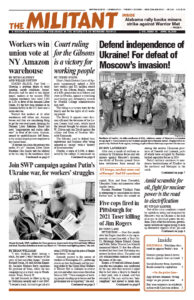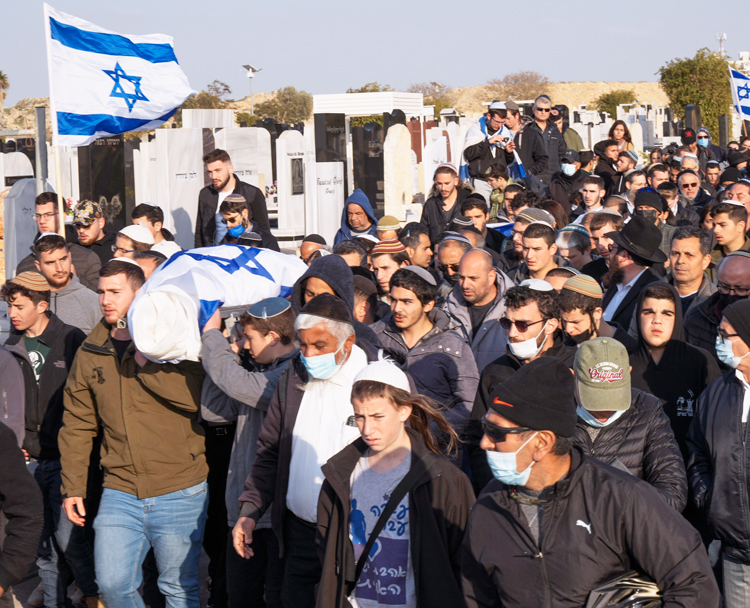Eleven people were killed in three terrorist attacks inside Israel March 22-29, as reactionary Islamist forces sought to inspire a wave of anti-Jewish violence, widening divisions between Jews and Arabs and undermining increased diplomatic and economic ties between Israel and Arab and Muslim governments in the region.
Of the 11 killed, seven were Jewish, two were Ukrainian immigrants, one was a Christian-Arab policeman and one was a Druze border guard. Jews were the target, but the terrorists didn’t really care who else they murdered.
Most Arab citizens of Israel are opposed to the attacks, as are many Palestinians in the West Bank and Gaza Strip. But the Israeli government’s policy of carrying out collective punishment — often tearing down the homes of perpetrators’ families, regardless of whether or not the families condemn the attacks — fuels resentment that is fostered and utilized by Islamist terror outfits.
The first attack was carried out in Beersheba by Mohammad Ghaleb Abu Al Qi’an, a Bedouin and Israeli citizen from the nearby town of Hura. He ran over and killed a bicycle rider and stabbed to death three others in eight minutes. He had pledged allegiance to Islamic State.
The second attack by two brothers, Arab citizens of Israel from Umm al-Fahm, was also claimed by Islamic State. That March 27 assault left two border police dead in Hadera.
The third attack in Bnei Brak, was carried out by Diaa Hamarsheh, a resident of the West Bank city of Ya’bad. He killed five people with an M-16 rifle, including two non-Jewish Ukrainian construction workers and an Arab-Christian police officer, Amir Khouri, who was engaged to a Jewish woman.
In response to the killings, the Israel Defense Forces and police carried out a wave of arrests in the West Bank and Israel and the IDF reinforced its combat battalions in the West Bank.
Hamas, the reactionary Islamist party that rules Gaza, praised all three sets of killings. “We are proud of the Palestinian people and the free people of the nation in the face of the heroic attacks that struck all of Israel,” said Hamas leader Ismail Haniyeh.
Another Hamas leader, Saleh Al-Arouri, called the attacks a response to the March 28 summit of top government officials from Israel, the U.S, Bahrain, Egypt, Morocco and the United Arab Emirates, held in the Negev desert, the first such meeting on Israeli soil.
It was a direct outgrowth of agreements made in 2020 between the Israeli government and four Arab governments that ended decades of treating Israel as a pariah state.
Advanced by the Donald Trump administration, the pacts were tied to building a common front against the expanding military influence of the regime in Iran, which opposes Sunni Arab governments and calls for the destruction of Israel. The pacts led to greater trade and other relations. They also opened the door to more travel and contact between Israeli and Arab workers, which can advance their unity and solidarity in defending working-class interests against attacks by bosses and their governments.
Days after the Negev summit, the first ever visit took place by an Israeli president to a Jordanian monarch. President Isaac Herzog met King Abdullah II in Amman, Jordan, March 30.
Many Arabs in Israel spoke out against the attacks.
“We strongly condemn this specific attack [in Beersheba] and all others,” Habes Al-Atawneh, chair of the municipal council in the Bedouin town of Hura, told i24NEWS. “We’re meant to live and work together.”
Terror attacks widely condemned
“There’s fear that the attack will harm coexistence in general,” Umm al-Fahm resident Mohammed Abu Hussein told Haaretz. “This is an act that doesn’t reflect the Arab community.”
Mansour Abbas, leader of the United Arab List, which is part of the coalition of governing capitalist parties, called the killings “a despicable, vile terror crime.”
“We are determined to walk a peaceful path, despite all the extremists,” he said.
In a relatively rare statement, Palestinian Authority President Mahmoud Abbas condemned the terror attacks, saying, “The killing of Israeli and Palestinian civilians will only lead to a deterioration of the situation ahead of Ramadan.” But if Abbas wanted to help put an end to these deadly assaults he could end the so-called Palestinian Authority Martyrs Fund, which makes monthly payments totaling millions of dollars to the families of residents of the West Bank who die in the course of carrying out exactly such killings.


